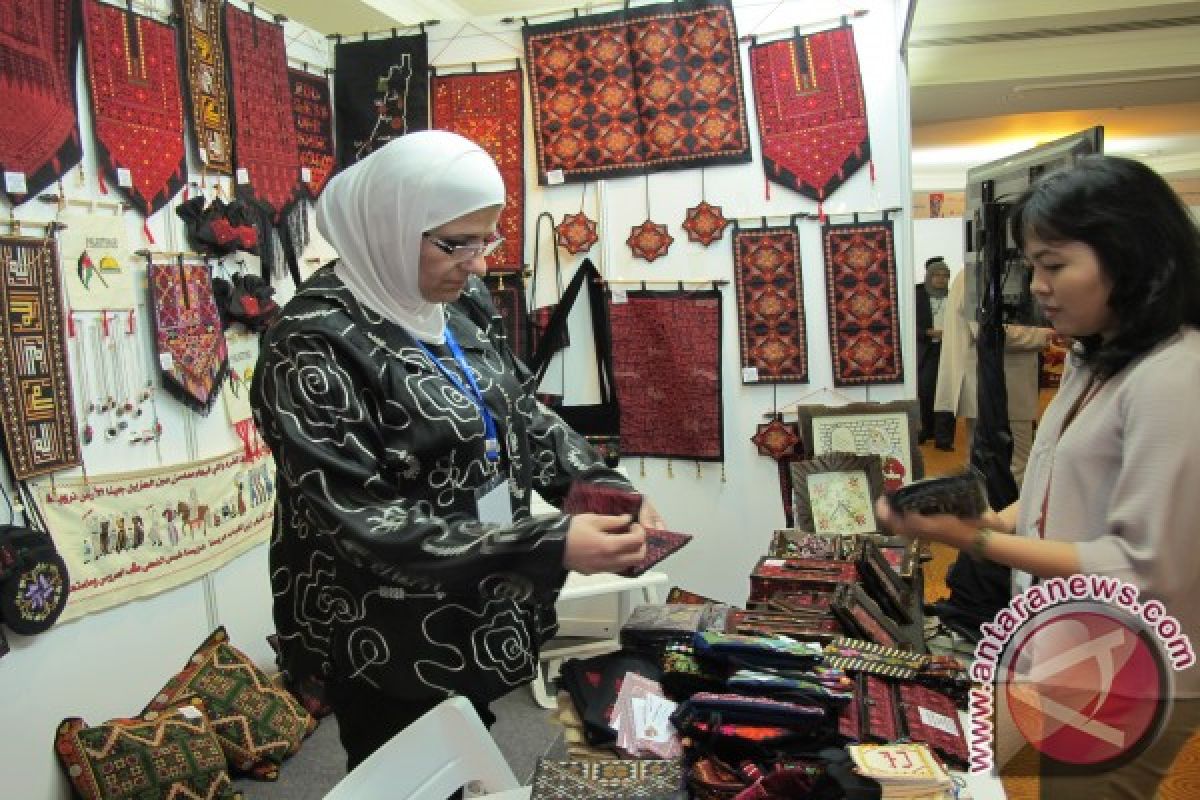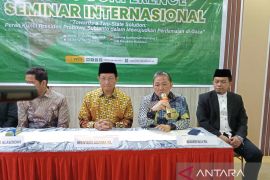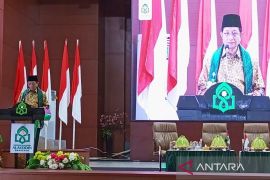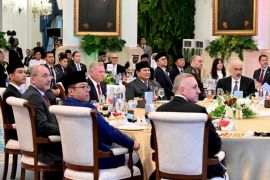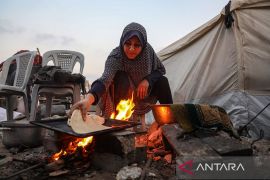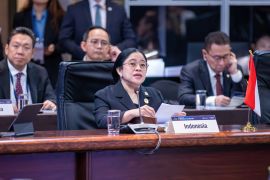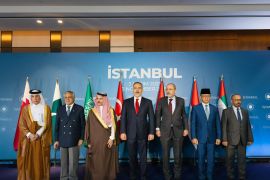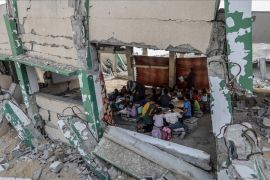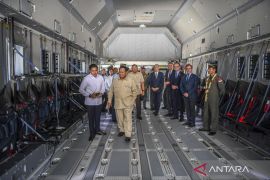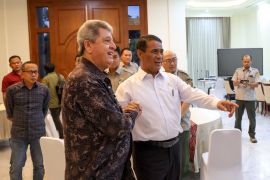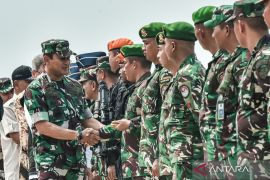"I bought five bottles of olive oil, which were cheaper than if you buy them in the supermarket in Jakarta, and some ceramics. I don`t care too much about the price, I accepted it as part of a contribution for Palestine."Jakarta (Antara News) - Talks about Palestine and its people often view the country as a disputed land, full of conflicts, extremists and other problems, not to mention that it is the holy land for three religions.
But, during the Conference on Cooperation Among East Asian Countries for Palestinian Development (CEAPAD) II held in Jakarta on March 1-2, 2014, there was a new perspective of how cooperation among countries and organizations might allow Palestinians, through their own efforts, to develop their country.
Since the declaration of Palestinian independence in 1988, the struggle to become a sovereign state had been continuing, colored by political disagreement, conflicts with Israel, not to mention poverty and a lack of education.
Despite the continuing debate about a two state solution, and since Palestine moved from being a non-member observer entity to non-member observer state on December 29, 2012, more countries and non-government organizations have come together to help and support Palestinian development to assist in governing its own state.
Indonesia and Palestine have a long history of friendship and partnership. Palestine was one the first nations which recognized Indonesian independence in 1945, and Indonesia was a co-sponsor for Palestines membership in the United Nations.
In July 2008, Indonesia also co-chaired the New Asia-Africa Strategic Partnership (NAASP) with South Africa to support Palestinian development through providing capacity building programs based upon Palestinian needs.
Through the NAASP, the Asian-African participants agreed to support Palestinian state-building efforts by providing ten thousand capacity building training programs by 2013, one thousand of which were to be delivered by Indonesia.
Five years after NAASP was launched, Indonesia has provided no fewer than 1,200 capacity building training sessions in various sectors for Palestinians.
For Indonesia, CEAPAD is a complementary coordination mechanism of the NAASP.
Besides Indonesia, Japan, as a developed country, co-sponsored CEAPAD on February 13-14, 2013, seeking to support Palestines state-building efforts.
During the first CEAPAD gathering, held in Tokyo, participants from ten countries and several international organizations, such as the UN Relief and Work Agency for Palestine (UNRWA), IDB and the World Bank, agreed to focus on human resource development as the key factor in Palestinian efforts to build a state.
The beginnings of CEAPAD I was followed up by CEAPAD II, hosted by Indonesia and aiming more concrete plans to support Palestinian development.
Nearly six decades after the Asia-Africa Conference in 1955, and not withstanding the tremendous transformations that have occurred in much of Asia and Africa, the Palestinian struggle continues.
However, with change, specifically as the capacities of the countries of Asia, Africa, and East Asia, in particular, have been rising, their collective ability to support the institutional abilities of the State of Palestine also have increased.
"This opportunity must be seized. And that is the essence of the present conference (CEAPAD II)," Indonesias Minister of Foreign Affairs Marty Natalegawa said during his opening remarks in Jakarta on March 1.
The Indonesian Government and people of Indonesias support and solidarity for Palestine was also recognized by the international community, as was its contribution in peacekeeping forces, political support, and capacity building assistance in various sectors.
For Indonesia, as stated in its constitution, freedom is the right of all nations, hence all types of colonialism must be eliminated from the world.
Thus, Indonesia is committed to support the two-state solution for Palestine and Israel, as well as Palestinian state-building efforts.
"Hopefully Palestine could become a full member of the United Nations by the end of this year," said Marty, who was the representative of Indonesia when it was a co-sponsor of Palestines application in the UN.
Particularly in the framework of CEAPAD, Indonesias contribution will be focused on capacity building in infrastructure, Information and Communication Technology (ICT), tourism, light manufacturing, and agriculture.
The total assistance that will be delivered by Indonesia to Palestine in 2014 was estimated to reach US 1.5 million dollars. That amount might seem small, compared with Japans initial commitment of US 20 million dollars for Palestinian grassroots projects, but Indonesia was one of the largest donors from developing countries, as well as having accepted a position as a provider country.
"Indonesia has taken its place as a provider country, instead of always being a recipient. Moreover, through its assistance to Palestine, Indonesia also has the chance to learn and share information about economic and political potentials to other countries, especially in Palestine," the Foreign Affairs Ministrys Director General of Information and Public Diplomacy, AM Fachir, stated.
Indonesia was also highly praised for its initiative to include the private sector in CEAPAD as a crucial entity which plays a critical role in Palestinian development.
As the host of CEAPAD II, Indonesia held a trade expo and business forum that was jointly sponsored by the Indonesian Chamber of Commerce (KADIN) and Islamic Development Bank (IDB), which brought no fewer than 30 businessmen from Palestine to exhibit their products and build a network with the private sectors from East Asian countries.
Some ten small and medium enterprises (SMEs) from Palestine, including crafts, food, agriculture, and dairy producers, displayed their products during the trade expo March 1-2, 2014 in Jakarta.
Held at Hotel Borobudur in Jakarta, with a minimum of promotions and with only a small banner announcing the fair in front of the hotel, the Palestinian product trade fair attracted many visitors.
Some ten booths displayed various products, including Palestinian ceramics, crafts, clothes and shoes, snacks, olive oil and its subsidiary products, as well as dairy products such as yoghurt, cheese and ice cream.
One of the exhibitors, Ramzi Anabtawi from Al-Arz Ice Cream, a company based in Nablus, Palestine, said the food industry in Palestine had been developing, but it lacked a market, since there is limited access to export their products.
Many visitors went back and forth to Al-Arzs booth to taste its ice cream, which contains milk, chocolate and pistachio. Anabtawi said they brought a container of ice cream and placed a prize of 100 thousand rupiah per box. On March 2, the last day of the expo, Al-Arzs ice cream was sold out.
"It tastes great, and the price was comparable with others, and moreover it is for Palestine," said Wahyu, one of the visitors who bought Al-Arz ice cream on Sunday (March 2).
Similarly, Astari, who came to the expo with a group of girl friends, said she was shopping, not only because some of the goods were Palestines special products, but also to demonstrate her solidarity with Palestine.
"I bought five bottles of olive oil, which were cheaper than if you buy them in the supermarket in Jakarta, and some ceramics. I dont care too much about the price, I accepted it as part of a contribution for Palestine," she said.
"I do hope they will organize another show of Palestines products, with more exhibitors, a larger location and publicity," Astari added.
What Astari expected might come true in the near future in Japan, according to a joint statement, saying Japan will provide assistance for Palestinian companies to participate in the International Food and Beverage Exhibition (FOODEX Japan) in late March 2014.
However, the trade expo and business forum held on the side line during the CEAPAD II meeting presented the message that the economy of Palestine has been moving forward, but still needs additional support.
As briefly noted by Palestine Prime Minister Rami Hamdallah during his keynote speech at CEAPAD II, major challenges are hampering their aspirations for a sustainable state, such as the fact that 62 percent of Palestines land is still controlled by Israeli Authorities, the systematic isolation of East Jerusalem and the Gaza Strip has been conducted by Israel, continuous construction of Israeli settlements, and an unsustainable economic outlook with a deficit estimated at some US 1.3 billion dollar in 2014 and debt of US 4.6 billion dollar.
"Despite the above, we believe in hope and we count on your assistance for providing more political support in the international arena, to ultimately fulfill my peoples dreams of self-determination, independence and freedom, and enabling the ongoing peace negotiations aimed at reaching a lasting and comprehensive peace framework aligned with the two-state solutions," Hamdallah said.
In line with Prime Minister Hamdallah, 27 delegations attended CEAPAD II, coming from 22 countries and 5 international organizations, who approved a joint statement which reiterates the commitment to support Palestine and the ongoing Middle East peace process.
This commitment is to be made concrete through supporting the development of Palestine, including capacity development and reinvigorating the business environment, as part of the realization of the two-state solution based on UN resolutions and the Arab Peace Initiative.
CEAPAD would strengthen its constructive role and organize regular consultations among Palestine and East Asian countries, including their aid agencies, to mobilize more effective assistance to Palestinians through emphasizing the role of the private sector.
CEAPAD also seeks to encourage future cooperation through the existing trilateral cooperation of Japan and Indonesia, Japan and Malaysia, Japan and Singapore and welcomes new projects through the additional cooperation of Indonesia and Thailand, Japan and Indonesia, Japan and Malaysia, and Japan and Thailand.
CEAPAD will also ensure the sustainability of the impact of the programs and emphasize the conference as a forum to exchange experiences, encourage support for Palestinians, including its refugees, and to add value to the already existing initiatives and processes aimed at assisting Palestinian development.
Through such continuous support and assistance, both politically and economically from the international community, it is probable that Palestinians will attain their sovereignty as a nation, based upon the two-state solutions framework.
"An independent and economically viable state of Palestine--and not to mention being a full member state of the United Nations--will surely contribute to global peace and stability in the Middle East," Indonesias President Susilo Bambang Yudhoyono stated during his opening remarks at CEAPAD II in Jakarta on March 1, 2014. (*)
Reporter: Azi Fitriyanti
Editor: Fardah Assegaf
Copyright © ANTARA 2014
